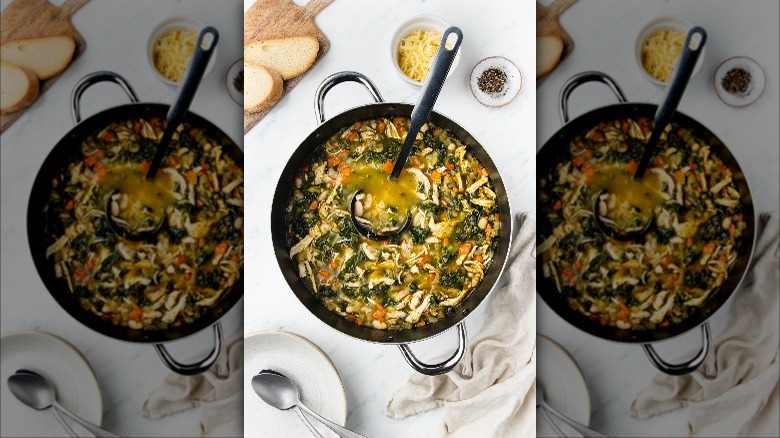What's The Best Way To Store Leftover Chicken Pesto Soup?
Before you can have leftover chicken pesto soup, you first have to have some chicken pesto soup in the first place. While you might be able to order it from a restaurant or buy it at the grocery store, you could also make it yourself with this recipe from Mashed developer Catherine Brookes. As to why you might want to, according to Brookes, this dish is "a comforting elixir that's packed with wholesome ingredients and full of herby flavor." If you want a more down-to-earth description, what you'll be making is a hearty soup filled with chicken, cannellini beans, carrots, celery, kale, and onions and flavored with — you guessed it — pesto (hence the name). Brookes' recipe makes four servings, but if you're dining solo or à deux, you'll very likely have leftovers. Luckily, as Brookes assures us, storing the soup for later is "super easy."
If you think you'll eat your leftover chicken pesto soup within a day or two, Brookes says you should put it in the refrigerator once it has cooled down to room temperature. She suggests pouring the soup into a large bowl and covering that bowl with plastic, but if you're prone to knocking stuff over, you might want to go with a plastic storage container that comes with a snap-on lid.
Freeze the soup for extended storage
If you can't eat all of the leftover chicken pesto soup in four days, which Catherine Brookes says is the maximum amount of time it can be refrigerated, then you should go ahead and freeze it. While some types of soups such as ones made with dairy, grains, or potatoes shouldn't be stored in the freezer, Brookes assures us that this chicken vegetable soup is perfectly freezer-friendly.
If you will be freezing the soup, Brookes advises doing so in individual portions so you'll only need to thaw what you plan to eat. She suggests that it will stay fresh for three months, but our old pal the USDA points out that there isn't a set limit for keeping foods frozen if safety is your concern. Perhaps it won't pose a health hazard if you leave the soup in the freezer for the next 50 years (as long as your freezer keeps running, that is). When it comes time to heat that soup back up again, you can thaw it overnight in the refrigerator and then warm it on the stove as long as you have the necessary patience to do so. If not, go ahead and nuke it since the microwave was pretty much made for reheating leftover soup.

